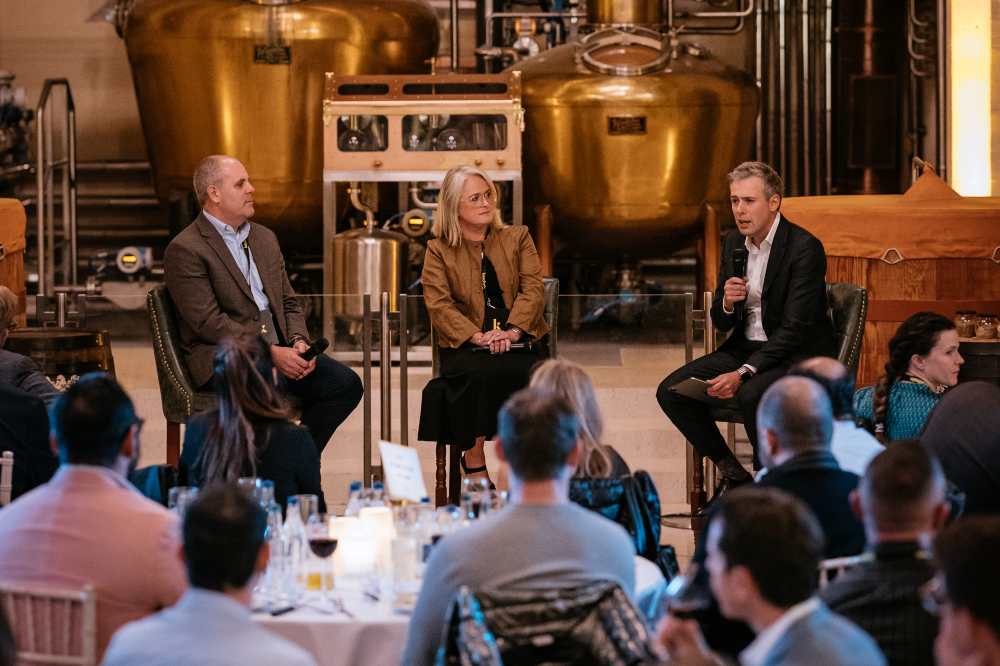Podcast Ep 279: Paul Swift from Bank of Ireland and Mark Kelly from AI Ireland on how Irish businesses can embrace AI tools amid competitive pressure from digitally-savvy competitors.
Business leaders are being encouraged to adopt artificial intelligence tools as competitive pressures mount.
The call comes ahead of a Bank of Ireland workshop in Dublin on 14 October aimed at demystifying AI for business owners across all sectors.
“It’s not AI that’s going to displace, it’s businesses that are using AI versus those that aren’t”
Speakers warn that Irish companies risk being left behind by rivals who are already leveraging the technology to streamline operations and expand into new markets.
The event reflects growing recognition that while AI adoption remains in its early stages, the technology is rapidly becoming essential for maintaining competitiveness.
Bridging the knowledge gap
“There are 700 million active users of ChatGPT now. That’s not going away – that’s in less than three years”
Paul Swift, head of Technology, Media and Telecoms Sector at Bank of Ireland, says the workshop emerged from direct feedback from customers.
“We’re hearing from customers who really don’t have an understanding or don’t really know what they don’t know about AI,” he explains.
The democratisation of AI through tools like ChatGPT has created new opportunities for businesses without technical experts. “This event is very much sector agnostic,” Swift notes. “It’s about really unpacking the principles, the background to AI, why businesses might need it, why they may not even need it.”
The workshop aims to equip business owners and founders with practical knowledge. “The aim is that they leave with a better understanding of all things AI, and more importantly, have more informed discussions with their people, and just understanding what’s going on around them,” Swift says.
Practical apps are driving adoption
Mark Kelly, who heads up AI Ireland, emphasises the practical benefits of AI adoption. Having interviewed over 750 leaders using AI daily to solve business problems, Kelly advocates for a straightforward approach. “I’m a big fan of practical AI. The goal is just really basic – helping people have two or three relevant use cases that they can use.”
The scale of AI adoption is already significant. “There are 700 million active users of ChatGPT now. That’s not going away – that’s in less than three years,” Kelly notes. Notably, 85% of users are outside the US, with Germany representing one of the largest markets.
Kelly identifies a key challenge in AI adoption: “It’s not that people don’t want to use AI. They’re just tunnelling so hard to get through the next day they’re thinking ‘I have to learn something new, I’ve got so much going on.’“
Swift highlights one of AI’s most immediate benefits for business owners. “The advent of ChatGPT means nobody ever needs to start any project in any business anymore with a blank sheet of paper,” he says.
He offers a practical example: “Say it’s a small engineering business wanting to break into a new market. Before they might talk to Enterprise Ireland or an industry body. Now they could sit around in an office and say, ‘We are an engineering business, we do this type of work, we would like to enter the German market. What would make us interesting in terms of the German market?’”
Despite these capabilities, Swift remains surprised by low adoption rates. “I’m astonished at the number of businesses I’m still meeting that aren’t using it at the most basic level.”
Advanced tools and frameworks
Kelly advocates for learning what he calls “the love language of how to speak to AI” through prompt engineering. He recommends a framework: “persona, context, command, format. Act as if you’re this persona, give them the context of what you’re trying to solve, then command them to do something, and then the format could be a 100-page document, a PDF, whatever.”
Recent developments have made AI more accessible. “ChatGPT have made ‘projects’ available for everyone. Projects are like specific AI that relates to your sales project, your marketing project,” Kelly explains.
One particularly effective application involves creating specialist GPTs for common business functions. Kelly cites an example: “One company we work with had multiple calls asking HR about the handbook. So they took the 400-page handbook, turned it into a GPT, sent it out to their employees, and they’ve got self-serve answers in real time.”
The time savings can be substantial. “When people start to distil down frequently asked questions and time stealers, they start to improve workflow – save five minutes here, 15 minutes there, and suddenly you’ve saved a couple of hours a week,” Kelly says.
Addressing job displacement fears
Both experts acknowledge widespread concerns about AI displacing workers. Swift draws historical parallels: “It’s like every other revolution – industrial, internet, and all these things. When technology came along, everybody thought it was the death knell for different jobs.”
“There’s a whole world of opportunity – it’s just getting over the hump of fear of new technology and using it instead of being scared of it”
He argues the real risk lies elsewhere: “My view is it’s not AI that’s going to displace, it’s businesses that are using AI versus those that aren’t.” The technology’s primary function is efficiency enhancement. “It’s going to take out the mundane tasks and make you more efficient.”
MIT research supports this early-stage assessment. While 95% of businesses have deployed AI, “very few can actually say they’ve scaled it and are getting return on investment,” Swift notes.
Competitive advantage through early adoption
Kelly’s involvement in judging AI awards provides unique insight into competitive dynamics. “I’ve got this view from the top because we’ve got close to 200 applications for this year’s AI Awards. You’re looking at companies in the same industry, then looking at competitors and thinking, ‘Whoa, look at the difference.’”
He cites compelling examples of AI implementation. A large company now uses AI tools to scan contracts, reducing approval times from weeks to minutes. “Previously, contracts going from vendor to procurement, legal, accounts could take two to six weeks to get approved. Now the AI tool processes 100,000 documents, batches them into buckets, and when a contract comes in, it tells you exactly what text to insert to have a higher likelihood of approval.”
Rather than eliminating jobs, such implementations often enable expansion. Kelly points to a Cork call centre using AI for technical support while expanding into Spanish and French markets through instant translation. “The CEO isn’t saying ‘How do I get rid of people?’ but ‘How do I 3x my people? How do I add new markets?’”
Breaking down technical barriers
Swift identifies a critical barrier to adoption: technical intimidation. “Unfortunately, a lot of people who see themselves as non-technical will nearly glaze over when they hear about AI because there’s a fear factor. They think it’s all about coding and developing software, whereas this is a tool to help you with your job and make things more efficient.”
The workshop aims to dispel these misconceptions. “What we really want to achieve with the workshop is for our customers to leave thinking, ‘Okay, breathe, calm the nerves,’ and realize this isn’t about needing tons of software developers,” Swift explains.
The message is clear: AI tools are becoming accessible to businesses of all sizes. “There are lots of off-the-shelf tools that will do great things and help you potentially sell more, be better at customer service, enter new markets,” Swift urged.
“There’s a whole world of opportunity – it’s just getting over the hump of fear of new technology and using it instead of being scared of it.”
-
Bank of Ireland is welcoming new customers every day – funding investments, working capital and expansions across multiple sectors. To learn more, click here
-
For support in challenging times, click here
-
Listen to the ThinkBusiness Podcast for business insights and inspiration. All episodes are here. You can also listen to the Podcast on:
-
Spotify
-
SoundCloud
-
Apple





